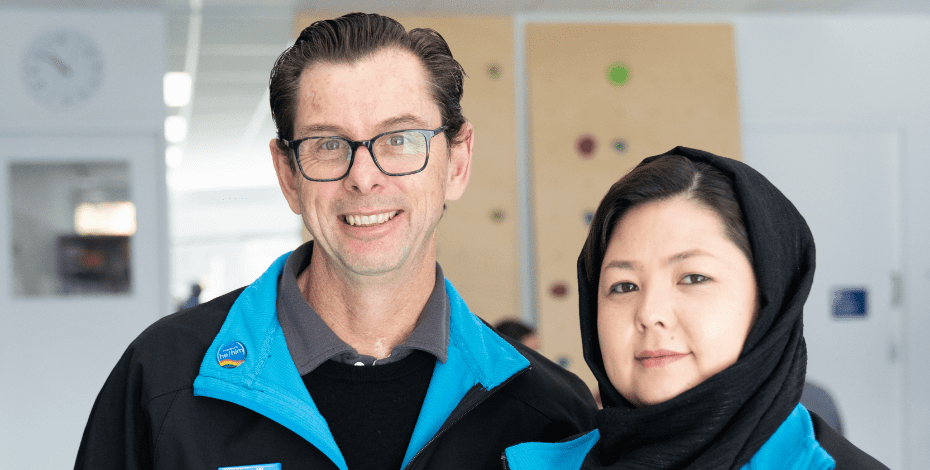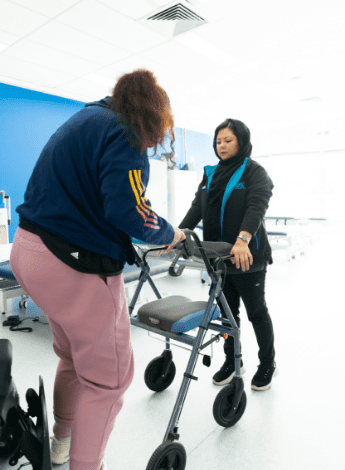
Pursuing a career in Australia

In 2021, the APA and the Australian Physiotherapy Council joined forces with Talent Beyond Boundaries to help Afghan physiotherapists resettle in Australia.
When the Taliban regained control of Afghanistan in 2021, life became more difficult for many of its citizens.
One such person was physiotherapist Fahima Mohammadi from Kabul.
‘I graduated as a physiotherapist in 2013 and worked in private hospitals and for some NGOs like the Norwegian Afghanistan Committee and the International Rescue Committee,’ says Fahima.
‘When the Taliban took over Afghanistan, I wasn’t able to continue with my education.
'It became dangerous for those who had worked with international NGOs, so I started to look for a way to leave the country and registered with Talent Beyond Boundaries (TBB).’
TBB was established to enhance refugee labour mobility, helping skilled and educated refugees who have been displaced from their countries find work and resettle in places such as the UK, Canada and Australia.
In collaboration with TBB and the Australian Physiotherapy Council, the APA then set up Physios for Refugees, specifically as a response to the crisis in Afghanistan.
In 2021, Melissa Trudinger reported on the early stages of the scheme for InMotion.
Since then, it has grown across the globe.
Steve Woollard APAM is the CEO of NeuroRehab Allied Health Network, which has clinics in Melbourne, Geelong, Albury and Hobart, providing rehabilitation for people with stroke, spinal cord injury, multiple sclerosis, Parkinson’s disease and other neurological conditions.
In November 2022, Steve asked his staff to vote on a number of potential initiatives as part of their environmental and social governance campaign.
‘Our team really got behind the idea of bringing in a refugee physio, particularly a woman from Afghanistan,’ says Steve.
‘We saw the Physios for Refugees call-out from the APA and got in touch with TBB.
'We then went through a list of potential candidates and Fahima’s CV stood out due to the amount of physio experience she has and the work she’s done to help the next generation of physios in Afghanistan.’

Fahima helping a patient during a rehabilitation session
The process for Fahima to move from Afghanistan to Australia was long—around 18 months rather than the suggested six months.
‘TBB put us in touch with an immigration agent who helped us organise the labour hire agreements and liaise with the government but then the process stalled for a long time,’ says Steve.
‘And eventually some rules changed and different deeds had to be written up.
'But gradually, step by step, we got through the process and in March 2024 Fahima’s visa was finalised.
'Then we had to work out how to actually get her out of Afghanistan.
'Thankfully, TBB had links with specialist organisations that help people to relocate and obtain flights out of Afghanistan.’
This is where things had the potential to become perilous.
‘I wasn’t allowed to go out or work alone so I didn’t enjoy my job.
'I wasn’t able to plan for the future or to reach my goals,’ says Fahima.
‘Every day I was waiting for updates from Australian immigration and TBB.
'But when I received my visa to come to Australia, the government said they would never let me leave the country, especially by myself.
'So my brother had to escort me to Iran and I stayed there for a week with friends before going to Dubai and then to Australia.’
Now that Fahima has resettled in Australia, there is a much clearer path for her continuing development as a physio.
‘Because her qualifications from Afghanistan aren’t officially recognised here, Fahima is currently working as an allied health assistant,’ says Steve.
‘There’s a lot of paperwork and training to do, either through an equivalence pathway or with limited registration and building up her competency, but she’s on her way to becoming fully registered with Ahpra and the Australian Physiotherapy Council.’
While the physiotherapy fundamentals aren’t that different between Afghanistan and Australia, how the work is carried out is in stark contrast.
‘In Afghanistan I wasn’t able to visit my clients in their homes because the Taliban wouldn’t let women drive or renew their licences.
'My driver’s licence expired the day I got to Australia so it then took a few months to be converted,’ says Fahima.
‘In Australia I can easily go to clients’ homes and we have access to more materials and equipment for exercises.
'In Afghanistan, we also didn’t have anything like the National Disability Insurance Scheme so there wasn’t much support for people with disabilities.
'But I love my profession. It makes me very happy to work with clients and help them to get better.’
Fahima has been warmly welcomed by the team at NeuroRehab Allied Health Network as well as by her new clients.
‘The core purpose of our organisation is for people with a neurological condition to live a life full of choice, inclusion and new possibilities,’ says Steve.
‘Hopefully, we have provided that for Fahima as well, presenting her with the ability to make choices and access freedoms that she may not have had under the Taliban in Afghanistan.
'We’re very happy to have been involved in it.’
While she is away from her family, Australia has quickly become a new home for Fahima.
‘I plan to stay here; when I was young and I was in Afghanistan, Australia was one of my favourite countries in the world,’ says Fahima.
‘I have a younger sister, in a similar situation to me in Afghanistan: she can’t go out, she can’t go to work and she can’t continue her education.
'I’m hoping to bring my family over here but it will be a long process.
'The people in Australia are so friendly and kind; I already feel like I’m an Aussie.
'I feel very relaxed around them and they have supported me a lot, especially Steve.’
Steve has a message for other physiotherapy clinics looking to make a difference—even a small one.
‘I’m super proud of what we’ve been able to achieve,’ says Steve.
‘This was our opportunity to work internationally on a world stage and make an impact and a small change.
'But if everyone could make that small change for people everywhere, then that would create a huge movement.
'There are definite costs involved in the relocation and all of the visa fees and everything else but if you’ve got the mind for it, the capacity and the passion to make a change, then absolutely get in touch with TBB; they’ll definitely be able to help you to achieve that.’
Fahima would love to see more physiotherapy clinics become involved with Physios for Refugees.
‘Hopefully there are other clinics in Australia who are like NeuroRehab Allied Health Network and can help physiotherapists in Afghanistan and other countries who want to go abroad and continue their work.
'I hope now that the APA and the Australian Physiotherapy Council can assist me with my registration as a physiotherapist here so I can help many more people in Australia.’
COURSE OF INTEREST: Neurological Physiotherapy Level 1 - Part B
© Copyright 2025 by Australian Physiotherapy Association. All rights reserved.





